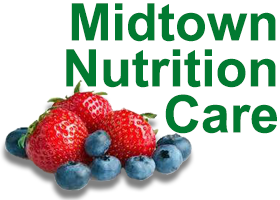JUICING
WHAT IS JUICING?
Juicing is the process that extracts the juice or fluid content from fruits and vegetables, discarding the fiber.
HOW IS JUICING DIFFERENT FROM BLENDING?
Blending finely blends food into a smoothie consistency, maintaining the fiber content, and allows for the incorporation of other whole foods, such as protein and grains.
WHY DO PEOPLE JUICE?
People choose to juice for several reasons including weight loss, detoxification, better energy, or to increase vitamin and mineral intake.
JUICING FOR WEIGHT LOSS
Juicing for weight loss is not recommended. Often you will still be hungry if you are replacing meals with juices, in part because you will miss out on fiber. Also, you may later overeat due to an extended period of inadequate nutrient and calorie intake. And you may gain back any weight lost, because it is difficult and unhealthy to sustain for a long period of time.
JUICING FOR DETOXIFICATION OR CLEANSING
There is very little evidence that juicing has any cleansing or detoxification benefits. Your liver is what detoxifies your system; so keep your liver healthy by eating less processed foods, refined sugars and carbohydrates, caffeine and alcohol. In addition, eat a variety of fruits, vegetables, whole grains, lean protein and healthy fats, drink plenty of water daily and exercise regularly to have a clean system. However, if you are otherwise healthy and want to juice for a few days, it should not have a negative effect on your health.
JUICING FOR INCREASED ENERGY OR ANTIOXIDANTS
It is important to keep in mind that energy comes from calories provided by carbohydrates, protein and fat. It is difficult to obtain enough calories solely from juicing fruits and vegetables. If you are not meeting your daily calorie recommendation you will likely have low energy. Vitamins and minerals from fruits and vegetables do not provide calories. They do however play a role in energy production in the body. There is nothing wrong with juicing for a boost of these nutrients that might otherwise be missed in a meal. If this is your goal, choose juices made from mostly vegetables and less fruit to provide vitamins and minerals with little added calories or sugar. Juicing for this purpose should be thought of as a supplement or snack, because juicing will not provide enough nutrients on their own to replace a meal.
A GOOD SMOOTHIE RECIPE:
The best “Juices” are Smoothies that contain whole fruits and vegetables, protein, fat and added fiber. This would be a healthy meal replacement and can easily fit into your calorie budget for the day if you are trying to lose, maintain, or gain weight gain, depending on the portion size:
– 2 cups of greens such as kale, spinach or Romaine lettuce
– 1 serving of fruit (1 cup or one piece)
– 1 serving of protein (1c low fat milk or plain yogurt, 1c soy milk, 1/2c tofu, 1 TB peanut or almond butter, or 1 handful of nuts)
– Added fiber: 1 TB ground flax seed or chia seeds or 1/4c dried oats
– Added healthy fat: Nuts, nut butters, flaxseed and chia seeds also provide healthy fats or you can add 1/4-1/2 of an avocado
